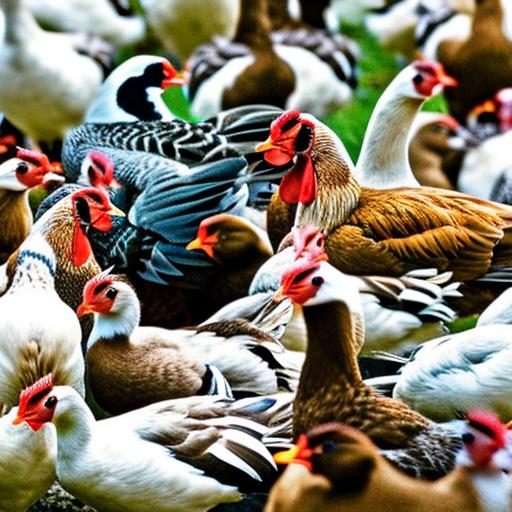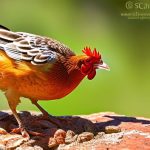Keeping chickens and geese together can be a rewarding and beneficial experience for both species. As a poultry enthusiast, I have had the pleasure of raising chickens and geese together on my farm for several years. Not only do they provide me with fresh eggs and pest control, but they also offer companionship and entertainment. In this article, I will discuss the behaviors of chickens and geese, the benefits of keeping them together, creating the ideal living environment, feeding considerations, health concerns, managing aggression, breeding habits, and tips for successfully keeping them together.
Key Takeaways
- Keeping chickens and geese together is possible and can be beneficial.
- Chickens and geese have different behaviors that need to be understood to ensure their compatibility.
- Benefits of keeping chickens and geese together include pest control, egg production, and companionship.
- The ideal living environment for chickens and geese should provide shelter, space, and access to water and food.
- Feeding chickens and geese requires different diets, but they can share some foods.
Understanding the Behaviors of Chickens and Geese
Chickens and geese have distinct behaviors that set them apart from each other. Chickens are known for their scratching and pecking behavior, as they search for insects and seeds in the ground. They are also social animals that establish a pecking order within their flock. On the other hand, geese are grazers that prefer to feed on grass and other vegetation. They are highly territorial and protective of their flock.
When chickens and geese are kept together, they can interact in interesting ways. Chickens may follow the geese around, mimicking their grazing behavior. Geese, in turn, may act as protectors for the chickens, alerting them to potential dangers such as predators. It is important to note that while chickens and geese can coexist peacefully, there may be occasional squabbles over food or territory. However, with proper management and adequate space, these conflicts can be minimized.
Benefits of Keeping Chickens and Geese Together
One of the main benefits of keeping chickens and geese together is increased egg production. Chickens are prolific layers, while geese lay fewer eggs but have larger yolks. By having both species in your flock, you can enjoy a variety of eggs for consumption or sale. Additionally, geese are excellent pest controllers. They will eat insects, slugs, and other pests that may harm your garden or crops. This natural pest control can help reduce the need for chemical pesticides.
Another benefit of keeping chickens and geese together is companionship. Chickens and geese are social animals that thrive in the company of others. By providing them with a mixed flock, you are fulfilling their need for social interaction and reducing the risk of loneliness or boredom. This can lead to happier and healthier birds overall.
Creating the Ideal Living Environment for Chickens and Geese
To successfully keep chickens and geese together, it is important to provide them with an ideal living environment. Both species require a secure and comfortable coop for shelter at night. The coop should be well-ventilated, predator-proof, and spacious enough to accommodate the number of birds you have. It is also important to provide nesting boxes for the chickens to lay their eggs.
In addition to a coop, chickens and geese also need access to outdoor space. Geese require a larger area to graze and roam compared to chickens. Ideally, they should have access to a fenced pasture or yard where they can graze on grass and other vegetation. Chickens can also benefit from free-ranging in a secure area, but they should be supervised to prevent them from wandering too far or becoming prey to predators.
Safety considerations are crucial when keeping chickens and geese together. Both species are vulnerable to predators such as foxes, raccoons, and hawks. Ensure that your coop and outdoor space are secure with sturdy fencing and netting to keep out predators. Regularly inspect the perimeter for any signs of weakness or potential entry points.
Feeding Chickens and Geese: Similarities and Differences
Chickens and geese have similar dietary requirements but may have different feeding habits. Both species require a balanced diet consisting of grains, protein, vitamins, and minerals. Commercial poultry feed formulated for chickens can be fed to both chickens and geese. However, geese may require additional greens and grass to supplement their diet.
Chickens are known for their pecking behavior and may eat more aggressively compared to geese. They are also more likely to eat insects and small animals they come across. Geese, on the other hand, are grazers that prefer to feed on grass and other vegetation. They may spend more time grazing and less time pecking at the ground.
When feeding chickens and geese together, it is important to provide enough food for both species. Ensure that there are multiple feeding stations to prevent competition and aggression over food. It is also important to monitor their intake and adjust the amount of feed accordingly to prevent overeating or malnutrition.
Health Concerns When Keeping Chickens and Geese Together

Keeping chickens and geese together can pose certain health concerns that need to be addressed. Both species are susceptible to common poultry diseases such as respiratory infections, parasites, and nutritional deficiencies. It is important to practice good biosecurity measures by regularly cleaning and disinfecting the coop, providing clean water, and monitoring the health of your birds.
Preventative measures such as vaccinations, deworming, and providing a balanced diet can help reduce the risk of disease. Regularly inspect your birds for any signs of illness such as lethargy, loss of appetite, or abnormal droppings. If you notice any concerning symptoms, it is important to seek veterinary care promptly.
Dealing with Aggression and Dominance Issues
Aggression and dominance issues can arise when keeping chickens and geese together. Chickens establish a pecking order within their flock, which can lead to bullying or aggression towards weaker individuals. Geese, on the other hand, are highly territorial and may display aggressive behavior towards other birds or humans.
To manage aggression and dominance issues, it is important to provide enough space for each bird to establish their own territory. This can help reduce conflicts over food or nesting areas. Additionally, providing multiple feeding stations and nesting boxes can help prevent competition and aggression.
If aggression becomes a persistent issue, it may be necessary to separate the aggressive bird from the flock temporarily. This can give the other birds a chance to establish their own hierarchy and reduce stress within the flock. However, it is important to reintroduce the separated bird gradually to prevent further aggression.
Breeding Chickens and Geese: What You Need to Know
Breeding chickens and geese requires an understanding of their different breeding habits and requirements. Chickens are known for their ability to lay eggs consistently throughout the year, while geese have a more seasonal breeding pattern. Geese typically lay their eggs in the spring and incubate them for about a month before hatching.
When breeding chickens, it is important to provide nesting boxes for them to lay their eggs. Collect the eggs regularly to prevent them from being damaged or eaten by predators. If you want to hatch chicks, you can either let the hen incubate the eggs or use an artificial incubator.
Geese, on the other hand, require a separate nesting area away from the chickens. Provide them with a secluded spot where they can build a nest and lay their eggs. Geese are excellent parents and will incubate and care for their goslings once they hatch.
Tips for Successfully Keeping Chickens and Geese Together
To successfully keep chickens and geese together, consider the following tips:
1. Introduce new birds gradually: When introducing new birds to an existing flock, do so gradually to minimize stress and aggression.
2. Manage flock dynamics: Monitor the behavior of your birds regularly and intervene if necessary to prevent bullying or aggression.
3. Maintain a healthy environment: Regularly clean and disinfect the coop, provide clean water, and monitor the health of your birds to prevent disease.
4. Provide enough space: Ensure that your birds have enough space to establish their own territory and reduce competition over resources.
5. Monitor feeding stations: Provide multiple feeding stations to prevent aggression and ensure that all birds have access to food.
The Rewards of Keeping Chickens and Geese Together
Keeping chickens and geese together can be a rewarding and beneficial experience. Not only do they provide fresh eggs, pest control, and companionship, but they also offer entertainment and a connection to nature. By understanding their behaviors, providing an ideal living environment, managing their diet and health, and addressing aggression issues, you can successfully keep chickens and geese together on your farm or backyard. I encourage you to try it yourself and enjoy the many rewards that come with it.
If you’re considering keeping chickens and geese together, you may be interested in learning more about creating a suitable living space for your feathered friends. Poultry Wizard offers a helpful article on how to convert a shed into a chicken coop, which can be a great option for accommodating both chickens and geese. This informative guide provides step-by-step instructions and valuable tips to ensure your coop is comfortable and secure for all your poultry. Check out the article here to discover how you can create a harmonious living environment for your chickens and geese.
FAQs
What are the benefits of keeping chickens and geese together?
Keeping chickens and geese together can provide a variety of benefits, including increased protection from predators, improved soil quality through their manure, and the ability to utilize different areas of a property for foraging.
What are the potential drawbacks of keeping chickens and geese together?
One potential drawback of keeping chickens and geese together is that geese can be aggressive towards chickens, especially during mating season. Additionally, geese require more water than chickens and can make a mess of their water source.
What should be considered when introducing chickens and geese to each other?
When introducing chickens and geese, it is important to ensure that they have enough space to coexist peacefully. It is also recommended to introduce them when they are young, as they are more likely to accept each other. Providing separate feeding and watering stations can also help prevent conflicts.
What should be the housing requirements for chickens and geese kept together?
The housing requirements for chickens and geese kept together should provide enough space for both species to move around comfortably. The coop should also be secure to protect them from predators. Additionally, separate nesting boxes should be provided for each species.
What should be the feeding requirements for chickens and geese kept together?
Chickens and geese have different dietary needs, so it is important to provide separate feeding stations for each species. Chickens require a diet high in protein, while geese require more greens and grains. Providing access to a variety of foraging areas can also help meet their dietary needs.
Meet Walter, the feathered-friend fanatic of Florida! Nestled in the sunshine state, Walter struts through life with his feathered companions, clucking his way to happiness. With a coop that’s fancier than a five-star hotel, he’s the Don Juan of the chicken world. When he’s not teaching his hens to do the cha-cha, you’ll find him in a heated debate with his prized rooster, Sir Clucks-a-Lot. Walter’s poultry passion is no yolk; he’s the sunny-side-up guy you never knew you needed in your flock of friends!







